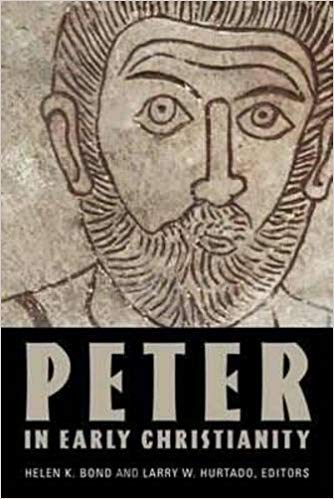The book entitled Peter in early Christianity, is a collection of essays from a conference at Edinburgh hosted by Larry Hurtado and Helen Bond in 2013, which was an attempt to assess the state of play about the ‘Rock’ known as Simon as it occurs in Biblical scholarship, and perhaps particularly to counteract the neglect of Peter in Protestant scholarship in modernity. Really in my life time there have only been a very few serious studies by Protestant scholars on Peter, with Oscar Cullmann’s, Martin Hengel’s, and Markus Bockmuehl’s being at the top of a very short list. During the same time frame there have been hundreds of studies on Paul by such scholars. So, this conference in 2013 was long overdue, and it resulted in a 384 page book published by Eerdmans in 2015 with the usual variety of essays and points of view proffered on Simon Peter and his potential contributions, written or otherwise, to the discussion of NT Christianity. What characterizes most of these essays is a reticence to say much about the ‘Simon of history’ and quite a bit more on the Peter of ‘early Christian memory’. Nor is there really much of an attempt to reconcile the two sorts of pictures of Simon. I probably don’t need to add that there is really little discussion of Peter as the first Pope, not least because the first century evidence of this notion is entirely lacking, and subsequently in the 2nd and third centuries not much of historical substance supports such a notion, as J.B.Lightfoot in his work on the Apostolic Fathers and the evolving theology of ministry in the early church made clear a very long time ago. Indeed, the evidence of Peter being the leader of Christian congregations in Rome is as scarce as hen’s teeth as well. Nevertheless, there are some very interesting essays in this volume.
The first essay by my late friend Larry Hurtado surveys the recent scholarship on Peter, chiefly by the authors I mentioned above. Of note is his summarizing of what Bockmuehl rightly mentions, namely that more recent scholarship has rejected the old F.C. Baur and company polarizing way of pitting Peter over against Paul, at the expense of Peter. Rather Peter is rightly seen as more of a bridge figure, a centerist, somewhere between the extremes of the Judaizing Pharisaic believers mentioned in Galatians and Acts 15, and the more radical antinomians Paul had to deal with, spawned by a misunderstanding Pauline thought. In an interesting exchange, Hurtado quotes Bockmuehl as saying that the ‘remembered Perer’ is neither an ‘authority nor an institution’ and so not the basis for traditional Catholic papal claims [but] the shepherd ministry assigned to Peter (in John 21) pertains ‘as long as the church endures’ thus ‘there must be a question of the proper succession to this Petrine ministry’ (p. 14). To this Hurtado insightfully responds “the continuation of Peter’s task or ministry is one thing, but the Roman Catholic claim about the authority of the papal office as unique successor to Peter is quite another.” (p. 15). Exactly, and therein lies the rub.













